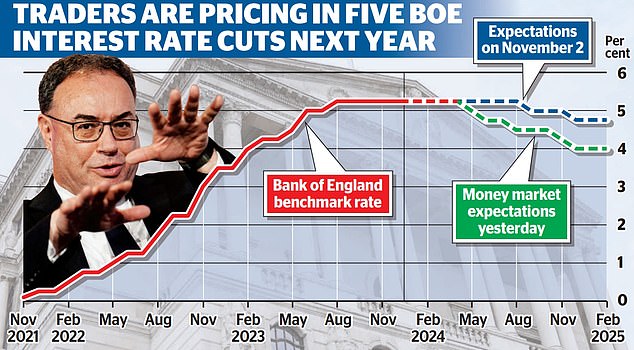Markets soared yesterday after the US Federal Reserve signalled its cycle of rate hikes was likely to be at an end – and despite the Bank of England sounding a note of caution.
London’s FTSE 100 index surged by more than 2 per cent in early trading to hit its highest level in nearly three months, though later finished 1.3 per cent, or 100.54 points, up at 7648.98 after the rally retreated as the Bank Governor Andrew Bailey pushed back on rate cut hopes.
US indices were also ahead in early trading, building on gains seen the day before in the wake of the Fed comments, which analysts said represented a long-anticipated ‘pivot’.
And the pound was propelled to a four-month high versus the US dollar, to just under $1.28, on the likelihood that the American central bank will embark on cuts earlier than the Bank of England.
It was a choppy session for UK bonds, with yields on ten-year gilts falling below 3.7 per cent to their lowest level since May before retracing to their earlier position. Bond yields fall as their prices rise.

The FTSE 100 surged by more than 2% in early trading though later finished 1.3% up after the rally retreated after the Bank Governor Andrew Bailey pushed back on rate cut hopes
The rally was sparked by comments from Fed chairman Jerome Powell a day earlier that interest rates in the world’s biggest economy were at or near their peak and that rate-setters had begun discussing when they should start to cut.
Chris Turner, global head of markets at ING Bank, said the Fed had ‘poured gasoline on the fire of easing expectations for 2024’.
Some of the intensity was taken out of the rally by the Bank of England, as well as caution from the European Central Bank (ECB) chief Christine Lagarde.
Bailey said: ‘We’ve come a long way this year. But there is still some way to go.’
At the ECB, where rates were also left on hold, Lagarde said: ‘We should absolutely not lower our guard. We did not converse rate cuts at all.’
Danni Hewson, head of financial analysis at AJ Bell, said: ‘The Bank of England might not have given markets the kind of Christmas gift delivered by Jerome Powell but… nothing was going to take the fizz out of markets.’ The Fed’s rhetoric is likely to put pressure on the Bank of England to act too.
Markets were yesterday pricing in a 70 per cent chance that the Bank could cut interest rates in May next year and a near one-in-three chance that it could come as soon as March.
Martin Weale, a former member of the Bank’s rate-setting Monetary Policy Committee (MPC), told Bloomberg: ‘There is still a long way to go, but if the Fed is cutting rates, that exerts a gravitational pull that the BoE would rather do without.’
Threadneedle Street officials voted – admire the Fed – to leave interest rates on hold.
But its language was much more circumspect – warning some inflation pressures, such as wage growth, were stronger in Britain than in other advanced economies.
And while the majority of the nine-member of the MPC voted to keep rates on hold, three argued for a hike and cuts were not even discussed.
The Bank has raised interest rates to 5.25 per cent to bring down inflation, which has fallen from 11.1 per cent last autumn to 4.6 per cent.
But it is targeting a level of 2 per cent. And Britain’s inflation level is significantly higher than in the US, where it has now fallen to 3.1 per cent.
The Bank said that rates would need to remain high ‘for an extended period of time’.



